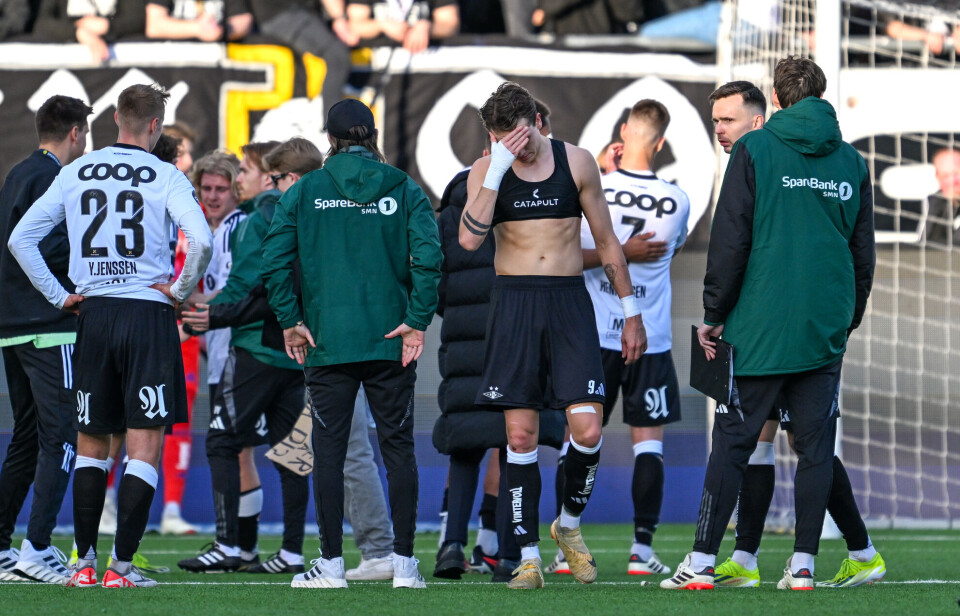THIS CONTENT IS BROUGHT TO YOU BY The Norwegian School of Sport Sciences - read more

Youth coaches must be especially careful: "Three matches a week is too much"
How can football clubs better control fatigue and recovery for their players? Håvard Wiig has clear advice after researching Norwegian elite players.
“It becomes an endless match programme, without a break,” Håvard Wiig says, referencing elite football as it has developed both nationally and internationally in recent years.
Perhaps it is even tougher for the promising young players who get the chance to play on many different teams at once.
Håvard Wiig is a researcher at the Norwegian School of Sport Sciences' Department of Physical Performance. He has looked at various tools that can ensure that the coach and club have control over the players' load.
GPS in sports bras
“The problem is that it quickly becomes too much over time. Normally, when you start at a sports academy, you train fully with your team in the evening; in addition, you also have training in the morning," says Wiig.
He adds that if you are a good player, you might play on multiple teams, such as the national team and the senior team.
"You should ideally train a bit in between these sessions, otherwise your form will decline over time,” he says.
This is where his research comes in.
You may have seen the sports bra that most football players run around with? Inside it are GPS units that provide important data.
With this data, you can find out how much the player has run, at what speed, and the number of accelerations during the match.
But what does it actually mean if a player runs 10,000 metres during a match?
“If you have good tools to control how much load the players have, it becomes easier to plan for the load during matches and training,” explains Wiig.

21 sessions with Strømsgodset
Wiig's research group followed 18 players in the top-league Strømsgodset football club over 21 sessions.
The players wore a GPS unit and registered how they themselves perceived the load.
The results showed that there was a strong correlation between how tough the players perceived the session to be and the external load measured by the GPS unit.
But perhaps the most interesting finding for the football researchers is the large individual differences between the players.
The players had different perceived loads at the same external load. They varied in how they perceived the difference between a low and high external load.
They each have their own profile, in a way.
However, the GPS unit does not provide all the answers.
“The GPS units do not capture everything. For example, there may be a session with a lot of duels and jumping. This is an activity that is tiring without generating such a great distance on the GPS measurements,” says Wiig.
"Those are some of the most important things I want to convey from my research. Football players are different and must be followed up individually and should be measured against themselves.”
Require three days before the next match
In another study, they followed 81 players from six different clubs in a single match with motion sensors. The researchers also conducted several tests after the match, such as a jump test, sprint test, running test, blood tests, and muscle biopsies.
One of the main findings was that football matches lead to minor damage in muscle cells. The amount of such damage seems to be related to the distance the players cover at high speed.
This, in turn, affects recovery.
“It may be important for clubs that use GPS units to specifically look at the distance the players cover at high speed. But we also saw that the players who ran the longest distances did worse on a sprint test they performed on day three after the match,” Wiig says.
But when can you actually expect a player to be ready for the next match?
Wiig believes that, as a general rule, you need three days before a new match. Something his research also shows.
“It depends on the match you have played and the recovery measures you take, and there are probably some individual differences as well. Most people probably need three days before a new match," he says.
Youth coaches must be especially careful
Wiig believes that coaches in youth football should pay special attention.
“Three matches a week is too much. If you play on Sunday, it's not good to play a new match on Tuesday. It doesn't happen often in elite football, but in youth football, it probably happens to a greater extent. If you're not careful to control the load, there will quickly be overexploitation of some players,” he says.
Even though youth teams do not have the resources to use GPS units like the elite clubs generally do, there are several ways to manage the load.
“You can use the subjective method where you get the players to rate the session from one to ten based on how tough it was and then multiply by the duration. Then you get a measure of the load,” says Wiig.
But the calendar can be an equally important tool.
“The easiest thing is probably to use the calendar and see how many sessions and matches the players have. And then make sure there are enough rest days in between. It's difficult for a 16 or 17 year old to say no to playing those extra matches. So here the coach has an even more important role,” believes Wiig.
References:
Wiig, H. Physiological and perceived exertion responses to training and match load in football: External and internal load, neuromuscular fatigue, muscle damage, and recovery, Doctoral dissertation at the Norwegian School of Sports Sciences, 2024.
———
Read the Norwegian version of this article on forskning.no

This content is paid for and presented by The Norwegian School of Sport Sciences
This content is created by The Norwegian School of Sport Sciences' communication staff, who use this platform to communicate science and share results from research with the public. The Norwegian School of Sport Sciences is one of more than 80 owners of ScienceNorway.no. Read more here.
More content from The Norwegian School of Sport Sciences:
-
Football expert wants to change how people watch football at home
-
Kristine suffered permanent brain damage at 22: "Life can still be good even if you don’t fully recover"
-
Para sports: "The sports community was my absolute saving grace"
-
Cancer survivor Monica trained for five months: The results are remarkable
-
What you should know about the syndrome affecting many young athletes
-
New findings on how athletes make the best decisions




































